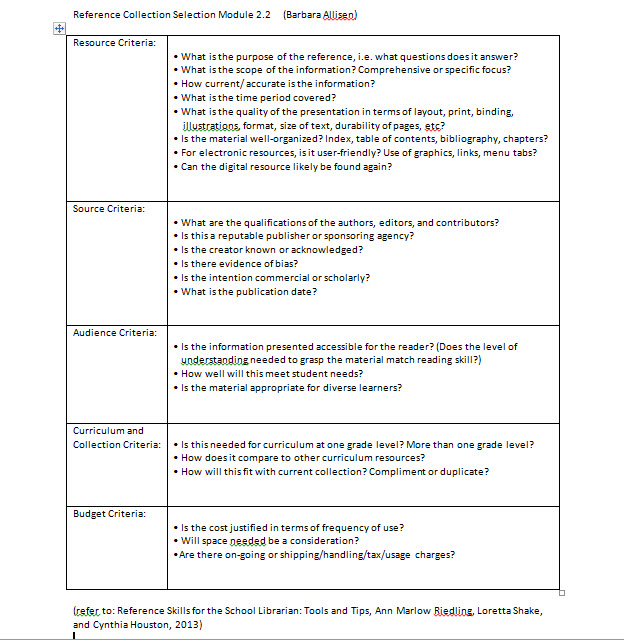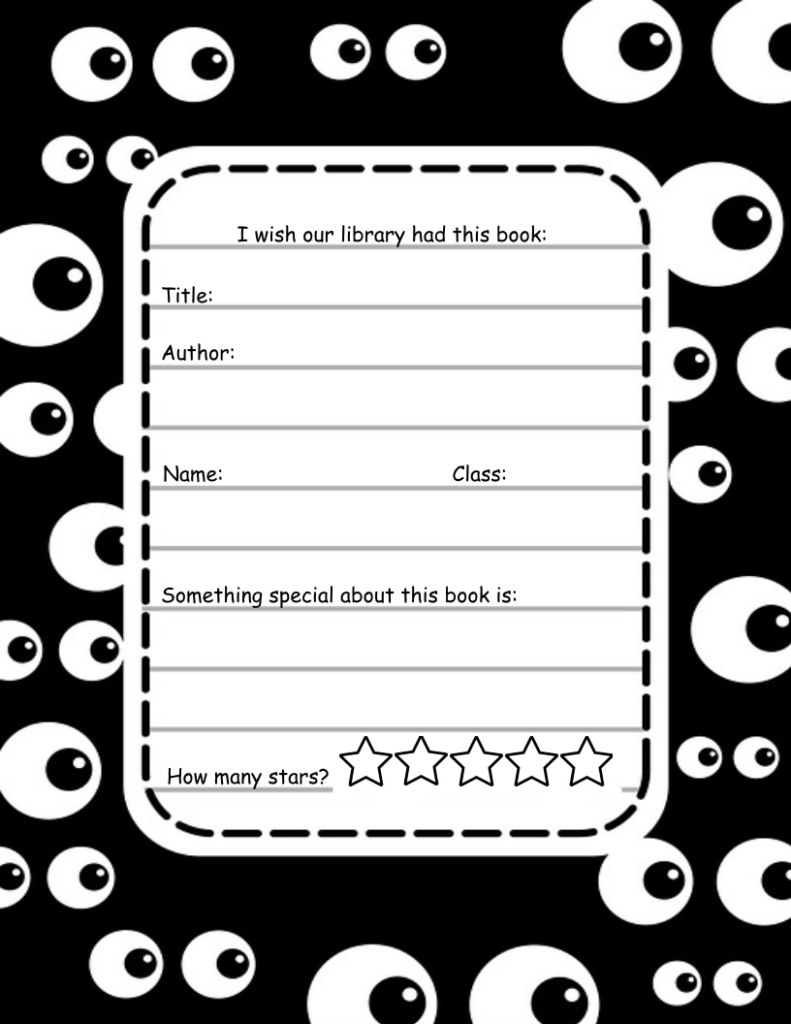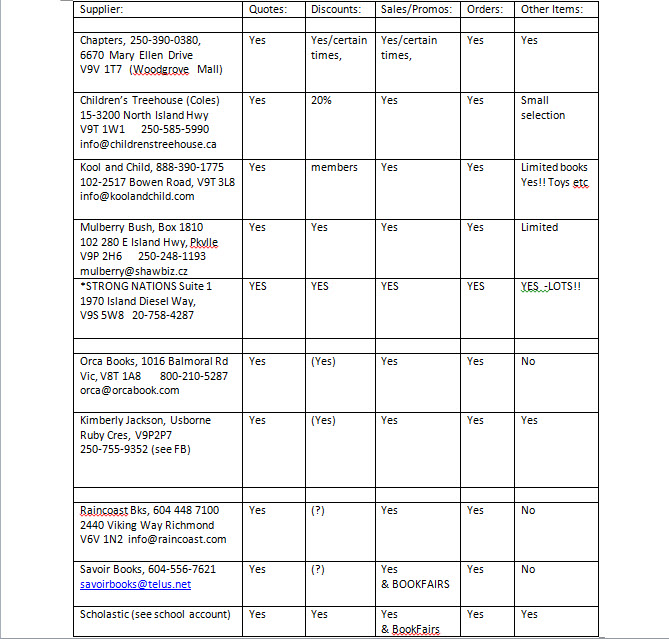Job Descriptions for Library Staff
(from School Library Policy and Procedures Manual)
Library Technicians:
- maintain library resources and records,
- general clerical and technical support,
- reports to Library Services Superviser
Library Clerks:
- maintain library automation system
- receive, process, locate, circulate library resources
- track expendidtures
- produce documents such as book orders, lists, reports
- inventory collections
- sets up displays
- provides clerical support such as photocopying, collating, filing, etc.
- provides technical support to TLs, staff and students
- assists training volunteers
- may supervise students and volunteers
- locates and researches information for library resources
- repairs library materials and may do basic maintenance on equipment
- These duties may be required at more than one school and occasionally other duties assigne.
Parent Volunteers:
- may check in/out materials
- assist with holds, circulation problems,
- may check overdue, circulation, and other lists,
- assist with shelving, tidying, shelf-reading,
- examine materials and inventories when needed
- assist with book fairs and sales
- assist students and may photocopy resource materials for individuals
- set-up displays, gather materials
- file publisher catalogues
Teacher-librarians are also to be present to supervise volunteers, both for the protection of the volunteer, and to offer support and direction as needed.
Student Volunteers:
Teacher-librarians may create student volunteer position. Tasks are similar to parent volunteers, depending on the age and ability of the volunteer, and are supervised by TLs.
Student Library Teaching Assistants:
There is no separate section for Student Teachers but one would assume duties to be similar to student/parent volunteers and to Teacher-Librarians, again, under the supervision of the TL or Learning Commons teacher.

SELECTION OF LEARNING RESOURCES
- Responsibility for Selection of Learning Resources
a. The Board of School Trustees delegates the responsibility for the selection of learning resources to the professional staff employed by the school system.
b. While selection of learning resources involves many people (administrators, teachers, students, community persons, resource centre personnel) the responsibility for coordinating the selection of learning resources and making the recommendation for purchase rests with the principal and professional personnel.
- Objectives of Selection
a. For the purposes of this statement of policy, the term, “learning resources” will refer to any person(s) or any material (whether acquired or locally produced) with instructional content or function that is used for formal or informal teacher/learning purposes.
Learning resources are integral to the educational program of a school. Learning resources can include textbooks, other books, supplementary reading and informational materials, charts, community resource people, agencies and organizations, dioramas, filmstrips, flash cards, games, globes, kits, machine readable data files, maps, microfilms, models, motion pictures, periodicals, CD-ROM, pictures, realia, slides, sound recordings, transparencies and video recordings.
b. The primary objective of learning resources is to support, enrich, and help to implement the educational program of the school through the interaction of professional personnel and other members of the school community. It is the duty of professional staff to provide students with a wide range of materials at varying levels of difficulty, with diversity of appeal, and the presentation of different points of view.
c. To this end, the Board of School Trustees of School District No. 68 (Nanaimo) affirms that it is the responsibility of its professional staff:
– To provide materials that will enrich and support the curriculum, taking intoconsideration the varied interests, abilities, learning styles and maturity levels of the students served;
– To provide materials that will facilitate the development of process skills.
– To provide materials that will stimulate growth and factual knowledge, literary appreciation, aesthetic values, and societal standards;
– To provide materials on various sides of controversial issues so that young citizens may have an opportunity to develop under guidance the practice of critical analysis and to make informed judgments in their daily lives;
– To provide materials representative of the many religious, ethnic, and cultural groups and their contributions to our national heritage and the world community;
– To place principle above personal opinion and reason above prejudice in the selection of materials of the highest quality, in order to assure a comprehensive collection appropriate to the school community.
- Criteria for Selection of Learning Resources
a. Emphasis will be placed on the selection of Canadian learning resources where appropriate. These resources include book and non-book learning materials, by or about a Canadian person, about a region or event, and/or produced in Canada.
The following criteria will be used as they apply:
- Learning resources shall support and be consistent with the general educational goals of the province and district, and the aims and objectives of individual schools and specific courses.
- Learning resources shall meet high standards of quality in factual content and presentation.
- Learning resources shall be appropriate for the subject area and for the age, emotional development, ability level, learning styles and social development of the students for whom the materials are selected.
- Learning resources shall have aesthetic, literary, and/or social values.
- Physical format and appearance of learning resources shall be suitable for their intended use.
- Learning resources chosen shall be designed to help students gain an understanding of our changing society (e.g. multicultural, pluralistic and nonsexist.)
- Learning resources shall be as free as possible of bias and stereotyping.
- Biased or slanted learning resources may be provided to meet specific curriculum objectives; for example, to recognize propaganda and its purpose in a given context or to balance an argument.
- Learning resources shall be designed to motivate students and staff to examine their own attitudes and behaviours, and to comprehend their own duties, responsibilities, rights and privileges, as participating citizens in our society.
- Learning resources shall be selected for their strengths rather than for their weaknesses.
b. The selection of learning resources on controversial issues will be directed towards maintaining a balanced collection representing various views.
Learning resources shall clarify historical and contemporary forces by presenting and analyzing inter-group tension and conflict objectively, placing emphasis on recognizing and understanding social and economic problems.
- Procedure for Selection of Learning Resources
a. In selecting learning resources, professional personnel will evaluate available resources and curriculum needs, and consult Ministry catalogs of recommended resources. If recommended materials are not available to meet local needs, professional selection tools will be used. The actual resource will be examined whenever possible.
b. Recommendations for purchase involve individuals such as administrators, classroom teachers, teacher/librarians, students, district personnel, and community persons, as appropriate. Teacher librarians, as resource specialists, are key to the selection process.
c. Gift materials shall be judged by the criteria outlined, and shall be accepted or rejected by those criteria.
d. Selection is an ongoing process which should include the removal of materials no longer appropriate and the replacement of lost and worn materials still of educational value.
Adopted 78.12.13
Amended 1993.06.23
Amended 1996.01.31
Appendix 3 Reconsideration of Learning Resource Material
SCHOOL DISTRICT 68 (NANAIMO-LADYSMITH) POLICY NO. 3703
RECONSIDERATION OF LEARNING RESOURCE MATERIAL
A resident and/or parent of a student of the school district may formally challenge learning resource material used in the district educational system. Individuals shall be invited to complete a form requesting reconsideration of the use of material, and shall, if the matter is not resolved through regular administrative channels, have a personal interview with the Curriculum Advisory Body.
If the matter is not resolved by the Curriculum Advisory Body, the matter together with the report of the Curriculum Advisory Body will be referred to the Board of Trustees whose decision will be final and binding.

Reference Collection Selection

And a fun way to ask students what they would like…

 Book Suppliers
Book Suppliers

